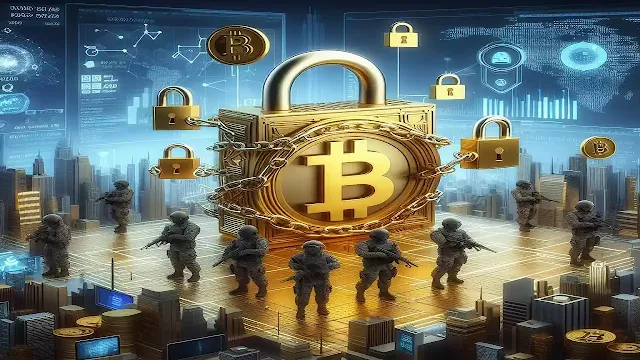Cryptocurrency Security Best Practices 2024: Protecting Your Digital Assets
Introduction
Alright, fellow crypto enthusiasts! Let's dive into the world of cryptocurrency security and arm ourselves with the knowledge to safeguard our precious digital assets. In this ever-evolving landscape of blockchain and decentralized finance, it's crucial to stay ahead of the curve and ensure that our investments remain safe from prying eyes and devious hackers.

Cryptocurrency security best practices 2024
Understanding the Risks
Cryptocurrency is like the Wild West of the digital world – thrilling, full of potential, but also fraught with danger. Before we dive into the nitty-gritty of best practices, let's take a moment to shine a light on the risks lurking in the shadows.
Cryptocurrency, with its decentralized nature and promise of financial freedom, has attracted the attention of cybercriminals far and wide. These nefarious individuals are like digital bandits, lurking in the dark alleys of the internet, waiting for the perfect opportunity to strike.
From phishing scams that trick unsuspecting users into revealing their private keys to sophisticated malware attacks that can hijack your wallet in the blink of an eye, the threats facing cryptocurrency enthusiasts are as diverse as they are cunning.
But fear not, fellow crypto adventurers! Armed with knowledge and vigilance, we can navigate the digital wilderness with confidence and ensure that our hard-earned coins remain safe from the clutches of these digital outlaws. So buckle up, stay alert, and let's embark on this thrilling crypto journey together!
The Dos and Don'ts of Cryptocurrency Security
Dos:
Use a Hardware Wallet: Think of it as a digital fortress for your crypto holdings. Hardware wallets store your private keys offline, away from the reach of hackers prowling the internet.
Enable Two-Factor Authentication (2FA): Adding an extra layer of security never hurts. With 2FA, even if someone manages to crack your password, they'll still need a second form of verification to access your accounts.
Stay Updated: Keep your software, wallets, and devices up to date with the latest security patches. Hackers are constantly probing for vulnerabilities, so staying one step ahead is crucial.
Practice Safe Browsing Habits: Avoid clicking on suspicious links or downloading shady software. It's like wandering through a sketchy alley in the real world – you never know what dangers lurk around the corner.
Diversify Your Investments: Don't put all your digital eggs in one basket. Spread your investments across different cryptocurrencies and platforms to minimize risk.
Don'ts:
Don't Share Your Private Keys: This should go without saying, but never ever share your private keys with anyone. It's like handing over the keys to your vault to a stranger – a recipe for disaster.
Avoid Public Wi-Fi for Transactions: Public Wi-Fi networks are a hacker's playground. Stick to secure, trusted networks when conducting crypto transactions to avoid falling victim to man-in-the-middle attacks.
Don't Fall for Phishing Scams: Be vigilant and skeptical of unsolicited emails or messages asking for your sensitive information. Phishing scams are rampant in the crypto world, so always double-check the source before clicking any links.
A Dash of Humor
Now, let's lighten the mood with a sprinkle of humor, shall we? Imagine your cryptocurrency as a digital pet – cute, cuddly, but also in need of protection. Would you leave your adorable crypto-kitty unattended in a sketchy alley? Of course not! Treat your digital assets with the same care and caution, and you'll be well on your way to becoming a crypto-security guru.
Staying Ahead of the Game
As we venture further into the realm of cryptocurrency, it's essential to adapt and evolve alongside the ever-changing landscape of technology and security threats. Here are a few additional tips to keep you ahead of the game:
Regularly Audit Your Accounts: Take a proactive approach to security by regularly auditing your accounts and transactions. Look out for any suspicious activity or unauthorized access and take immediate action if you detect anything fishy.
Backup Your Wallet: Just like you would backup important files on your computer, it's crucial to backup your cryptocurrency wallet. Store your backup in a safe place, preferably offline, to ensure that you can always recover your funds in case of a mishap.
Use Strong, Unique Passwords: Avoid using weak or easily guessable passwords for your crypto accounts. Instead, opt for strong, unique passwords that include a mix of letters, numbers, and special characters. And please, don't use "password123" – let's leave that in the past where it belongs.
Teach Yourself: Knowledge is power, particularly in the realm of cryptocurrency. Find opportunity to instruct yourself about the most recent security dangers and best practices. Go to online courses, read articles, and draw in with the crypto local area to remain educated and engaged.
Final Thoughts
As we wrap up our journey through the realm of cryptocurrency security best practices, remember that protecting your digital assets is not just about safeguarding your investments it's about safeguarding your future. By taking the necessary precautions and staying vigilant, you can navigate the exciting world of crypto with confidence and peace of mind.
So, fellow crypto enthusiasts, let's raise our virtual glasses to a future filled with prosperity, security, and maybe just a hint of unpredictability. After all, where's the fun in a journey without a few twists and turns along the way? Happy hodling, and may the blockchain be ever in your favor!
Conclusion
In the fast-paced and ever-evolving world of cryptocurrency, staying secure is not just important – it's absolutely paramount. Your digital assets are like treasures in the vast expanse of the blockchain, and safeguarding them should be a top priority.
By diligently following the best practices outlined in this guide and remaining vigilant against potential threats, you're not just protecting your investments – you're safeguarding your financial future. You can rest easy knowing that your crypto assets are shielded from the clutches of would-be attackers and cybercriminals.
So, arm yourself with knowledge, stay one step ahead of the bad guys, and embark on your crypto journey with confidence. And remember, while the road may have its twists and turns, may it also be filled with prosperity, laughter, and the occasional virtual high-five as you navigate the exciting world of cryptocurrency!
FAQs
Q: How can I protect my cryptocurrency from hackers? A: Implementing security measures such as using hardware wallets, enabling two-factor authentication, and staying vigilant against phishing scams can help protect your cryptocurrency from hackers.
Q: Why is cryptocurrency security important? A: Cryptocurrency security is crucial because it protects your digital assets from theft, fraud, and unauthorized access. Without proper security measures, your cryptocurrency could be at risk of being stolen by cybercriminals.
Q: What should I do if my cryptocurrency is stolen? A: If your cryptocurrency is stolen, you should report the incident to the relevant authorities and take immediate steps to secure your remaining assets. This may include changing passwords, freezing accounts, and seeking assistance from cybersecurity experts.
Q: Are hardware wallets necessary for securing cryptocurrency? A: While hardware wallets provide an extra layer of security by storing private keys offline, they are not strictly necessary. However, they are highly recommended for individuals holding large amounts of cryptocurrency or those seeking maximum security.
Q: How often should I update my cryptocurrency wallet and software? A: It's important to regularly update your cryptocurrency wallet and software to patch any security vulnerabilities. Aim to update them as soon as new versions or security patches are released to stay protected against emerging threats.
Q: What should I do if I suspect my cryptocurrency wallet has been compromised? A: If you suspect that your cryptocurrency wallet has been compromised, immediately cease all transactions and disconnect the device from the internet. Then, contact the wallet provider for guidance on securing your funds and investigating the breach.
Q: Can I recover stolen cryptocurrency? A: In some cases, stolen cryptocurrency may be recoverable through law enforcement or cybersecurity efforts. However, the process can be complex and depends on various factors such as the nature of the theft and the cooperation of authorities. It's essential to report the incident promptly and seek professional assistance.
Q: How can I verify the legitimacy of a cryptocurrency exchange or platform? A: Before using a cryptocurrency exchange or platform, conduct thorough research to verify its legitimacy. Look for user reviews, check for regulatory compliance, and confirm the security measures in place, such as encryption and two-factor authentication.
Q: Are there insurance options available for protecting cryptocurrency assets? A: Some cryptocurrency custodial services offer insurance coverage for digital assets held on their platforms. However, it's essential to review the terms and conditions of the insurance policy carefully and assess whether it provides adequate protection for your specific needs.
These FAQs provide additional insights into cryptocurrency security and address common concerns that users may have when safeguarding their digital assets.





